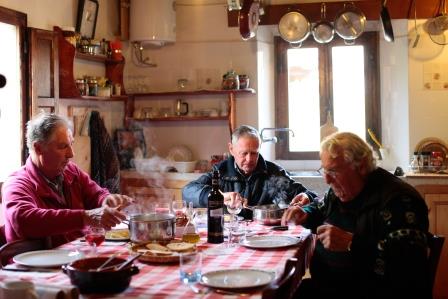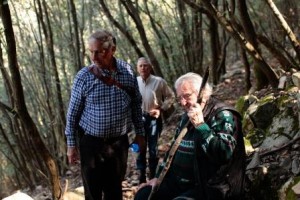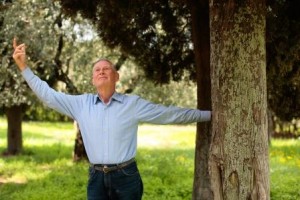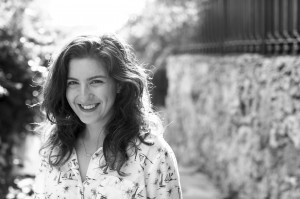Jerusalem Report pdf Reflections
Reflections from the Cave
Emmanuel Anati, 84, is addressing an annual conference of psychoanalysts in Sicily. An eclectic scholar, world-renowned for his expertise in archeology, anthropology and pre-historic art, Anati, for years, has been invited by this elite group to share his observations about various subject matters. This year, the topic is solitude.
“My dear colleagues,” begins Anati. He pauses and then continues. “For the first time, I am going to talk to you about something personal.”
This brief dramatic moment is included in the epilogue to the new Israeli documentary Shalom Italia (Hebrew version: Three Brothers and a Cave). Emmanuel, in the course of his lecture, will harken back to his childhood in Italy. He has just completed a journey with his two younger brothers in which the three visited the places where they grew up and hid during the Holocaust – places they had not been to in some 70 years.
Significantly, filmmaker Tamar Tal shows only the first sentence of Emmanuel’s lecture. This is in keeping with Tal’s restrained film-making style in which she resists the temptation to indulge in melodrama.
Instead, she weaves an intriguing character study of the three brothers around their late-life road trip that is rich with humor, yet unspoiled by a single maudlin moment.
The idea for making the film, Tal explains, grew out of a casual comment made by her father-in-law Reuven over a Friday night family dinner in Mazkeret Batya.
“Bubi [Reuven Anati], the youngest of the three brothers, mentioned that he was headed to Italy where he was determined to find the cave where he and his family hid during the Holocaust. His two older brothers, Andrea and Emmanuel, after a bit of convincing, had agreed to go with him,” recalls Tal, adding that she then had to convince the three to let her and cinematographer Emanuelle Mayer come along.
The Anati brothers consented, and a month later the five flew to Rome where they squeezed into a Fiat Panda and drove into the Tuscany countryside.
The brothers had never before traveled together without their wives and children. They also had never tried to find their old family home in Florence or talked very much, among themselves or with anyone else, about what happened to them when they were children.
The Anati family, headed by Hugo, a well-established architect, and Elza had lived in Florence for generations. In 1942, as Jews were being rounded up and deported to Auschwitz, Hugo and Elza, two grandmothers and their four sons, including Gabriel who died 20 years ago, fled into the countryside. During the next three years, they moved from one hiding place to another.
The dramatic structure of the film revolves around the attempt of Emmanuel, Andrea and Bubi to locate one hiding place in particular – a cave, high up in the mountains, that was their last safe refuge.
They wander around the forest, equipped with nothing more than picnic baskets, examining every possible lead. Where exactly was the cave? What was it like living there? Is it possible that there really wasn’t a cave, after all?
It soon becomes clear that whether or not they find the cave is not of paramount importance.
“They have become like they were as children again. And, now, despite all of their differences, the brothers can decide if they want to accept each other’s story as it is,” observes Tal.
As they climb, talk, argue, laugh, gaze into the breathtaking Tuscany scenery, and partake of local wines, cheeses, tomatoes and salamis, we begin to get a picture of three very different personalities with three very dissimilar recollections of the past.
Serious-minded Emmanuel, who was 14 years old when the family began its odyssey, is skeptical about many of the stories the others seem to recall. He speaks about the past with a sense of loneliness.
Andrea, cheerful in demeanor, 12 at the time, recalls playing Robin Hood with bows and arrows in the woods. “We had fun in the Holocaust,” he says unabashedly. He often is seen trotting up and down the mountainside ahead of the others.
Easy-going Bubi, 4 at the time, doesn’t really have too many first-hand memories but draws on stories he has heard from others. He initiated the trip and he is the most curious.
“What really interested me in making this film was exploring the way memories influence our lives,” says Tal. “I tried to focus on what happens when a group of siblings relive their childhood and unravel strands of memories. I wanted to let the viewer be in that moment with them and observe the effect it has on them.”
The film doesn’t include on-camera interviews or other didactic documentary techniques; instead, it emphasizes contemplative dialogues, melancholy and humorous sequence and lyrical renditions of landscapes as the brothers slowly come to terms with each other.
Tal lets the viewers draw their own conclusions about the nature of each individual and how they were affected by their memories. In the course of our interview, however, as she describes each character then and now, a clear connection emerges between past and present.
Emmanuel, who was forced away from his studies and friends at an early age, has built his career around academic study and seems most at ease wandering around the isolated desert landscape near his Mitzpe Ramon home in the Negev.
Andrea, the nature child, now in his eighties, continues to be a nature lover, spending his weekends pulling himself up and down mountains with climbing ropes.
Bubi, is a bit like both Andrea and Emmanuel. Like Andrea, he is immersed in nature and has built a career designing natural science parks around the world. Like Emmanuel, he was not willing – until now – to face the past, and previously did not attempt to venture near the family home in Florence, even though he spends half the year living in Italy.
Shalom Italia is Tal’s second feature-length documentary. Her previous film, Life in Stills, which portrays a grandmother and grandson in their struggle to preserve a family photo business, reflects the filmmaking style that Tal continues with in Shalom Italia ‒ an in-depth character study that revolves around dramatic events without dwelling on the events themselves. Life in Stills won both the Ophir (Israeli Oscar) and DocAviv awards for Best Documentary in 2012.
Tal, 36, studied photography and filmmaking at Tel Aviv’s Camera Obscura School for the Arts. She points out that an important influence on her work was the late David Perlov, one of the first Israeli filmmakers to bring a poetic auteur style to documentaries.
“His films taught me the importance of establishing and sharing your point of view with the audience. He also had a way of letting the audience be aware of how you are making the film,” says Tal, noting that she avoids manipulating the events that she is filming. “I try to simply document situations as they occur naturally. To me, it’s worth filming for an entire day in order to come away with just a single moment if that moment says something authentic about the characters.”
It took Tal more than three years to complete Shalom Italia ‒ in part because of the meticulous effort she put into the editing, collaborating with experienced film editor Boaz Lion in 120 editing sessions and, in part, because it took time to raise sufficient funding to complete the film with high quality post-production elements such as original music and sound mixing.
She succeeded in finding German co-producers Tina Leeb and Jurgen Kleinig, and, together with Israel’s Yes Docu channel and the Makor Foundation, cobbled together a budget that is in line with international productions.
The result is a compelling, finely honed cinematic work that riveted the packed audience that recently viewed it at the Tel Aviv Cinematheque.
Most Israeli documentaries are seldom shown outside of television broadcasts and film festivals, but Shalom Italia has continued to draw crowds for weekly theatrical showings for the past four months. The film had its international premiere at the AFI Festival in Washington in June and will soon begin world wide distribution.
Tal has already started her next project, a documentary series for the Yes Docu channel about women pilots in the Israeli Air Force. The project marks the first time the army has allowed cameras to film the pilot-training program. Given Tal’s previous films, it’s likely that viewers will soon get a profound look at what this experience is really like.
Bernard Dichek
The Jerusalem Report
Oct. 31, 2016




